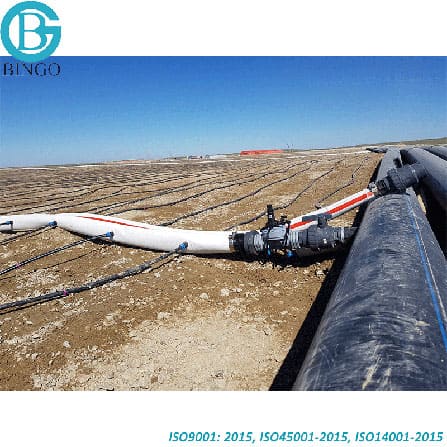How hdpe pipe suppliers Midland TX Are Enhancing Construction
Wiki Article
Comprehending the Secret Conveniences of HDPE Pipe for Water and Wastewater Monitoring
The use of HDPE pipeline in water and wastewater administration offers various benefits that merit consideration. Its phenomenal toughness and long life-span make it a recommended choice for several tasks. In addition, the product's resistance to deterioration and chemical damages improves its integrity in numerous environments. Nonetheless, the advantages prolong past simply longevity and resistance. Exploring its cost-effectiveness and ecological impact exposes also much more compelling reasons for its prevalent adoption in contemporary infrastructurePhenomenal Toughness and Durability

HDPE pipeline attracts attention for its exceptional toughness and longevity, making it a favored selection in water administration systems. Built from high-density polyethylene, these pipes can hold up against significant pressure and anxiety, ensuring dependable performance with time. Their robust nature permits them to sustain extreme ecological conditions, consisting of temperature variations and dirt motions, which can create various other products to fall short.
The lifespan of HDPE pipelines frequently goes beyond half a century, providing a cost-efficient remedy for towns and markets alike. Furthermore, the product's lightweight buildings simplify setup, minimizing labor prices and timeframes. This durability decreases the requirement for regular repair services or substitutes, additionally improving its economic allure.
In water administration applications, the reliability of HDPE pipelines indicates fewer disruptions and boosted solution connection, making them essential to sustainable infrastructure advancement. The combination of durability and longevity solidifies HDPE's function as a cornerstone in reliable water administration services.

Resistance to Rust and Chemical Damages
While numerous products catch rust and chemical damages gradually, HDPE pipelines display exceptional resistance, making them optimal for numerous water administration applications. This resilience comes from the molecular structure of high-density polyethylene, which is inherently non-reactive and does not wear away like metals or weaken from exposure to harsh chemicals. Consequently, HDPE is extremely efficient in environments with hostile compounds, such as wastewater systems that may consist of acids, bases, and organic solvents.
Additionally, HDPE pipes can stand up to ecological factors such as soil acidity and saline conditions, better enhancing their suitability for diverse applications (Pipe Supplier American Plastics Midland). Their ability to preserve architectural stability with time minimizes the risk of leaks and failings, which is vital in making sure the security and integrity of water distribution and wastewater management systems. Subsequently, the resistance to rust and chemical damage markedly adds to the overall effectiveness and durability of HDPE piping remedies
Cost-Effectiveness and Financial Advantages
When considering the monetary implications of water administration systems, the cost-effectiveness of HDPE pipes becomes evident. These pipelines use reduced installment and upkeep prices compared to conventional products like steel or concrete. Their lightweight nature simplifies transport and installation, leading to lowered labor expenses. Additionally, HDPE pipes exhibit a long lifespan, typically going beyond 50 years, which translates to fewer replacements and long-lasting cost savings.The resistance of HDPE to deterioration and chemical damage minimizes the requirement for pricey repair services and replacements. The pipelines additionally support efficient water circulation, minimizing power expenses related to pumping systems. By mitigating leaks and water loss, HDPE pipelines contribute to significant financial benefits for towns and industries alike. In general, the preliminary investment in HDPE piping can produce considerable monetary returns over the life expectancy of the water monitoring system, making it a prudent selection for lasting infrastructure growth.
Environmental Sustainability and Reduced Influence

Convenience and Flexibility in Installation
Due to their unique residential or commercial properties, HDPE pipes use impressive adaptability and flexibility in setup, making them appropriate for a wide variety of applications. Their lightweight nature enables simpler handling and transportation, lowering labor prices Pipe Manufacturing Midland TX and setup time. HDPE pipes can be bent and formed to fit numerous surfaces and task demands, which is particularly beneficial in testing environments.In addition, their resistance to rust and chemical damage enables installation in varied settings without the need for specialized safety finishings. The capacity to fuse joints develops a constant, leak-free system, enhancing the total integrity and integrity of the installment. HDPE's flexibility likewise suits ground motion, decreasing the threat of damage in areas susceptible to shifting dirt. On the whole, these qualities make HDPE pipes not only versatile but additionally a favored selection for water and wastewater administration systems.
Frequently Asked Concerns
How Does HDPE Pipe Contrast to PVC in Water Monitoring Applications?
HDPE pipeline offers exceptional flexibility, resistance to deterioration, and resilience compared to PVC. Its lighter weight helps with simpler installment, while its long life expectancy lowers substitute costs, making HDPE a recommended choice in water administration applications.What Is the Life-span of HDPE Piping Under Common Conditions?
Under normal problems, HDPE pipes can have a life-span varying from 50 to 100 years. Their toughness and resistance to rust add to their long-lasting performance in different applications, making them a reliable choice for framework.Are HDPE Piping Recyclable After Their Service Life?
Yes, HDPE pipes are recyclable after their life span. American Plastics HDPE Pipe for Oilfield. They can be processed and repurposed right into new products, substantially minimizing ecological effect and advertising sustainability within the sector, making them a green option for piping solutionsWhat Is the Installation Refine for HDPE Pipeline?
The installation procedure for HDPE pipes entails site preparation, trenching, pipeline blend or mechanical joining, backfilling, and stress testing. Correct methods guarantee a sturdy and effective system for transporting water and wastewater successfully.Can HDPE Piping Be Used for Both Safe And Clean and Non-Potable Water Solutions?
Yes, HDPE pipes can be utilized for both potable and non-potable water supply. Their flexibility, longevity, and resistance to deterioration make them suitable for different applications, making certain secure and effective transport of water in various contexts.Report this wiki page